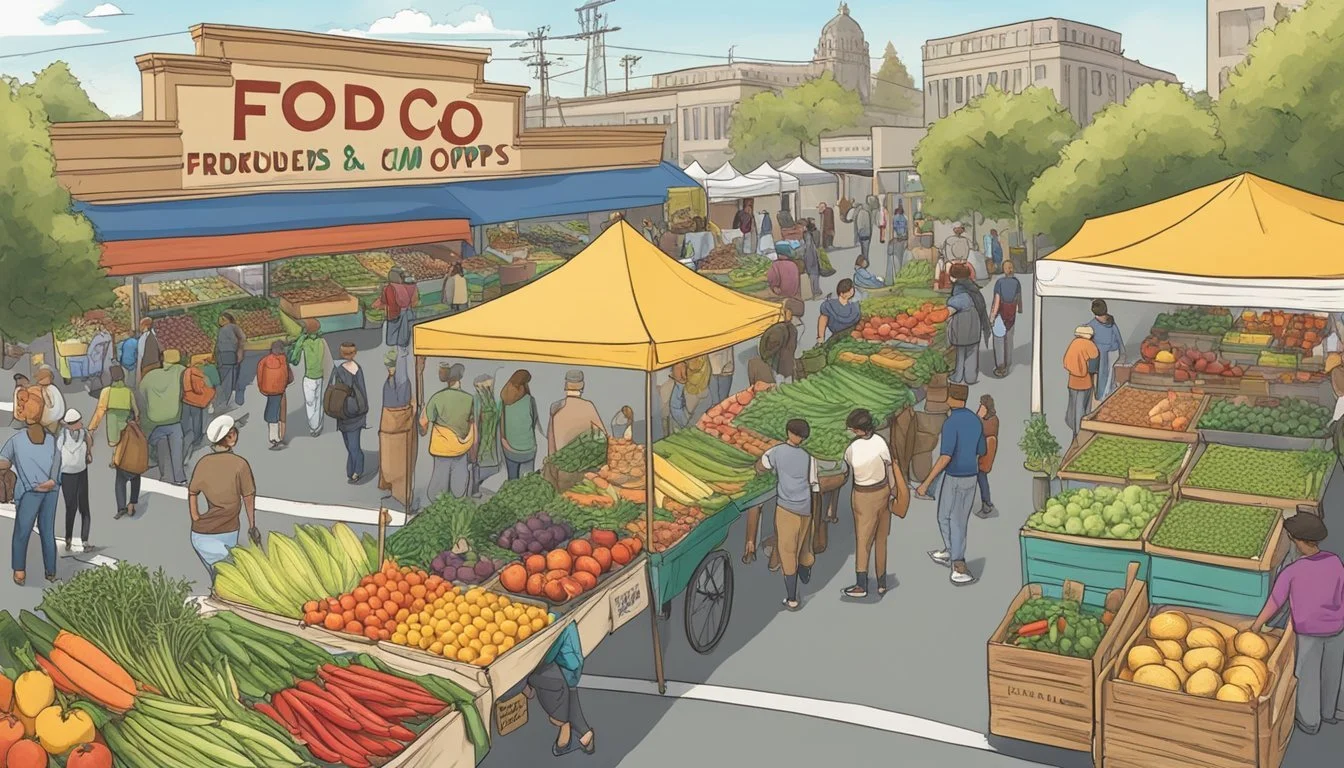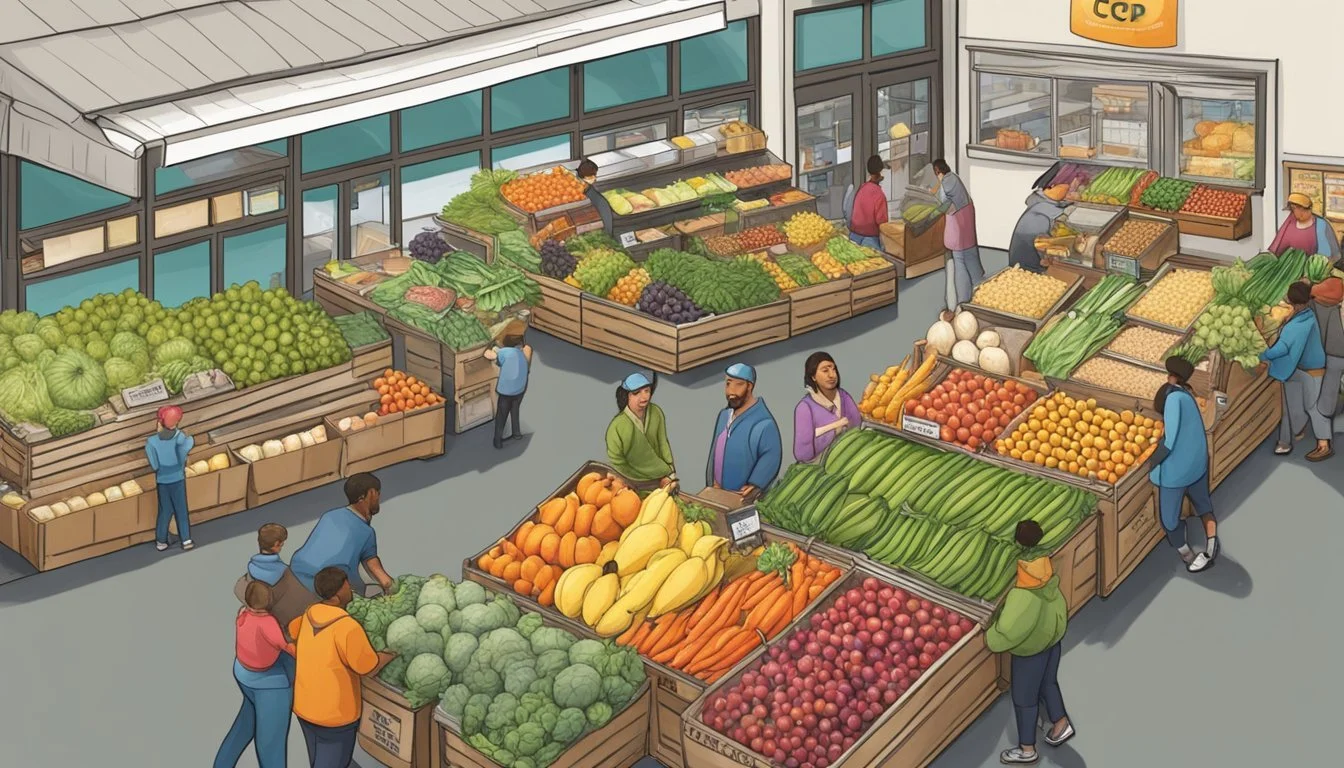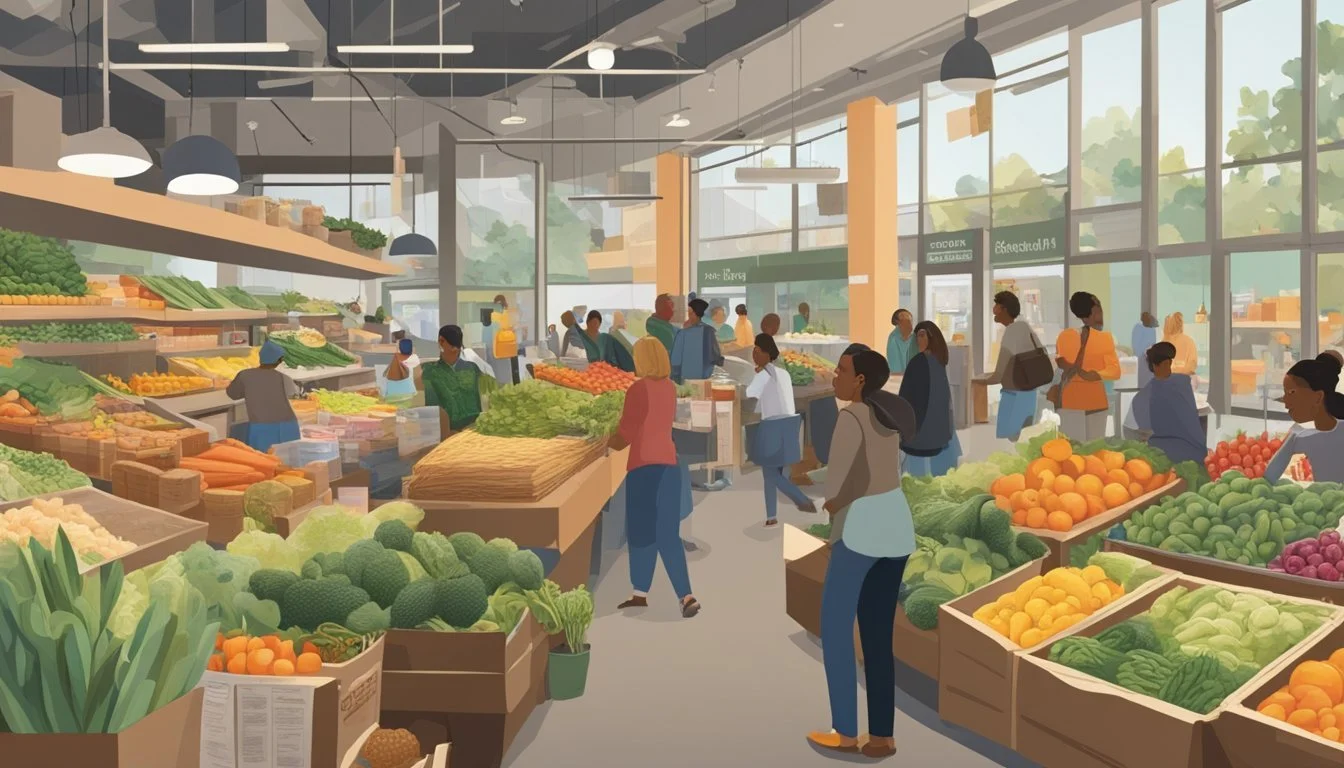Guide to Food Co-Ops in Berkeley, CA
Your Comprehensive Resource
Berkeley, California, has long been at the forefront of the cooperative food movement. Food co-ops in this vibrant college town embody a mission-driven approach to food systems, connecting consumers with local, often organic produce, and fostering a sense of community around sustainable practices. The city's history with cooperative food endeavors dates back to the 1930s, painting Berkeley as a pioneer in advocating for food sovereignty and communal participation in food distribution.
These cooperatives operate on principles that prioritize environmental responsibility, fair trade, and education about food sources and health benefits. Notably, the presence of institutions such as the Living Tree Community Foods and the Berkeley Student Food Collective illustrates the continuing commitment to these values. These co-ops function not just as grocery outlets but as educational hubs, where members and non-members alike can learn about the impact of their food choices on both local and global scales.
Within the network of food co-ops in Berkeley, consumers can find a variety of options from farmers markets to full-service grocers specializing in organic and vegan offerings. Each cooperative not only offers an alternative to conventional food shopping but also serves as a testament to Berkeley's ongoing dedication to cultivating an equitable, participatory food economy. They stand as cornerstones in the community, championing the benefits of cooperative economics while providing nourishing food choices.
History of Food Co-Ops in Berkeley
Berkeley, California, has a long-standing tradition of food cooperatives that have contributed significantly to the local food scene, emphasizing sustainability, community, and consumer education.
Berkeley Student Food Collective
The Berkeley Student Food Collective is a non-profit organization grounded in providing affordable, sustainable, and healthy food to the University of California, Berkeley students and the surrounding community. It's a student-run initiative that embodies Berkeley's spirit of self-reliance and community engagement.
The Cheese Board Collective
The Cheese Board Collective, established in 1971, is one of Berkeley's oldest food co-ops and a beloved institution. Pioneers in the sector, they've set the standard for quality and community-oriented business practices, known for their vast selection of cheeses and famous for their daily pizza offering.
Three Stone Hearth
Three Stone Hearth operates as a worker-owned cooperative kitchen that leverages local, sustainable ingredients to create health-focused foods. They exemplify the cooperative philosophy through their communal approach to the production and distribution of nourishing, traditional foods.
Mandela Grocery Cooperative
Mandela Grocery Cooperative is a standout co-op in nearby Oakland, dedicated to providing healthy, locally-sourced, and sustainable products. This worker-owned business highlights the power of cooperatives to foster food justice and economic empowerment in the community.
What Is a Food Co-Op?
A food co-op, or cooperative, is a food distribution outlet organized and managed by its members. It operates on a system where the control is democratically vested in its membership, with each member having an equal vote in decisions regarding the cooperative's functioning.
Core Features of Food Co-Ops:
Member Ownership: Individuals who shop at the co-op often have an option to become member-owners, contributing to both the financial and operational aspects of the business.
Democratic Decision-Making: Each member typically has a vote, thus embodying the principle of one member, one vote, which is central to co-op governance.
Sustainability: Many food co-ops prioritize sustainable business practices, sourcing locally and focusing on eco-friendly products.
Food co-ops are not merely commercial enterprises; they embody and promote community values. They usually offer a diverse selection of organic, fair-trade, and locally-produced food items, which mirrors their dedication to social and environmental responsibility.
Benefits to Members:
Shared Profits: Profits are often reinvested in the co-op or returned to the members.
Product Influence: Members influence what products are stocked, reflecting their collective preferences and dietary needs.
Education: Co-ops frequently engage in educating their members and the larger community about food sources, nutrition, and the importance of sustainable practices.
Through this cooperative model, food co-ops in Berkeley and beyond provide an alternative to traditional grocery stores, binding communities closer together while fostering food systems that members can trust and directly influence.
Benefits of Joining a Food Co-Op
Joining a food co-op in Berkeley offers a range of benefits, from securing fresh, organic produce to supporting sustainable shopping practices and contributing to the local economy.
Access to Fresh and Organic Produce
Food co-ops are renowned for their selection of fresh and organic fruits and vegetables. Members have the advantage of enjoying produce that's often picked at the peak of freshness, ensuring high nutritional value and optimal flavor.
Supporting Local Farmers and Producers
A significant benefit is the support given to local farmers and producers. These partnerships ensure that money spent at the co-op contributes to the local economy and sustains the agricultural community in and around Berkeley.
Environmentally Sustainable Shopping
Shoppers at food co-ops engage in environmentally sustainable practices. Co-ops typically minimize waste by offering bulk purchases and reducing packaging. Additionally, by sourcing locally, they reduce carbon emissions associated with long-distance transportation.
Nutrition and Health Advantages
The emphasis on nutrition is evident in the product selection at co-ops. They offer an array of healthy options, including items catering to special diets. This focus ensures that members have access to food choices that support their well-being.
Economic Advantages for Members
Members of a food co-op often enjoy economic benefits such as shopping discounts and patronage refunds. Purchasing collectively allows for better prices on goods, making organic and healthy options more affordable.
Guide to Berkeley Food Co-Ops
Berkeley, California, is known for its progressive and health-conscious community. In line with this ethos, the city boasts a rich variety of food co-ops that offer fresh, organic, and gourmet products, catering to vegetarians, vegans, and those seeking quality meats and personal care items.
Berkeley Bowl Marketplace
Berkeley Bowl Marketplace is renowned for an extensive selection of organic produce and gourmet items. Shoppers can explore aisles filled with fresh fruits and vegetables, a vast bulk section, and a variety of meat and seafood. It's a prime destination for those seeking both local and exotic ingredients.
The Food Mill
Established in the community for years, The Food Mill serves a selection of natural foods, including whole grains, nuts, and seeds. In addition to bulk staples, customers can find a variety of snacks and drinks as well as high-quality personal care products.
Rainbow Grocery
Rainbow Grocery operates on a cooperative model and is well-known for its dedication to vegetarian and vegan products. It provides an extensive range of organic produce, bulk foods, and personal care items. For those seeking alternatives to meat, Rainbow offers a diverse array of plant-based protein options.
Arizmendi Bakery
Arizmendi Bakery, part of a worker-owned co-op, offers a delectable selection of breads and pastries, many of which are made with organic ingredients. Their offerings include coffee and tea to complement their baked goods, making it a cozy spot for a quick bite or a relaxing break.
Monterey Market
Monterey Market is a favorite spot for those seeking high-quality, fresh produce at competitive prices. It provides a colorful array of fruits and vegetables, emphasizing local and seasonal items. Shoppers also find a selection of meat, bread, and pantry essentials here.
How to Participate in a Co-Op
Participation in a Berkeley, CA food co-op involves engaging in ownership, partaking in volunteer efforts, and embracing community activities. These cooperatives are built on principles of democratic decision-making and community-building, which offer members unique opportunities to contribute and grow within the co-op environment.
Membership and Ownership
To become part of a food co-op in Berkeley, one must first obtain membership. This often requires purchasing a share, symbolizing both financial investment and co-ownership. Members typically have a say in co-op matters, reflecting the co-op's commitment to democratic decision-making. They are entitled to vote on important decisions and can even be elected to the board, thus having a direct impact on the co-op’s future and empowering new leaders from within the community.
Purchase a Membership Share: To become a co-owner.
Engage in Governance: Attend meetings, vote, and serve on the board.
Volunteer and Workshift Opportunities
Volunteers form the backbone of many co-ops, with workshift requirements ensuring the smooth operation of the store. By trading labor for discounts or other benefits, members can reduce costs and develop a closer relationship with the co-op community. Volunteering also serves as a platform to train youth and adults alike in various aspects of retail and cooperative management.
Fulfill Workshift Requirements: Complete regular hours of work.
Join Various Committees: Contribute to specific areas like operations, finance, or community outreach.
Community Involvement and Workshops
Workshops and community events are a key part of the educational and engagement initiatives of the co-op. These sessions may focus on sustainable living, food sourcing, cooking, or broader issues like social justice. Such activities encourage community members to learn and interact, fostering a stronger, more informed, and cohesive group.
Attend Workshops: Gain knowledge in areas related to food co-op interests.
Participate in Events: Join community-building activities and initiatives.
Co-Op Governance and Operations
Food co-operatives in Berkeley are structured to foster democratic governance and maintain a sustainable business model. They empower new leaders through member involvement in decision-making processes and strive to keep living costs manageable.
Board of Directors and Management
The board of directors in a co-op is elected by the members to represent their interests and guide the cooperative according to its mission and values. They make strategic decisions and put policies into effect. The management then operationalizes these decisions, handling the daily administrative tasks necessary to run the co-op.
Financial Structure and Rent
Rent within the cooperative is determined by the costs to operate and maintain the housing and food services. Financial sustainability is achieved by shared member investment and reinvestment of surpluses into the co-op, rather than distributing profits to external shareholders. This structure supports the co-op's goal of providing affordable living and dining options to members.
Day-to-Day Operations
Day-to-day operations are a collaborative effort between staff and co-op members. Members contribute through work shifts, participating in the preparation of meals and maintaining communal spaces. This reduces operational costs and fosters community involvement and skills development, further reinforcing the co-op’s ethos of shared responsibility and empowerment.
Challenges Faced by Food Co-Ops
Despite their commitment to providing local and sustainable food options, food co-ops in Berkeley face a myriad of challenges that test their resilience and adaptability.
Economic Pressures and Competition
Food co-ops grapple with the economic pressures that come from having to maintain competitive prices while also offering fresh produce and sustainable products that are often more expensive to source. They operate in a market where large box stores and e-commerce platforms can leverage their scale to offer lower prices, making it a challenge for co-ops to be equally affordable and accessible to the community.
Balancing Growth and Community Values
As these co-ops expand, they must carefully balance growth with their core community values. Scaling up can strain the intimate connection they maintain with their locality and bring about a tension between becoming more commercially successful and staying true to the principles of community-building and supporting local farmers and producers.
Maintaining Stock and Product Variety
Offering a diverse range of products is essential for food co-ops to cater to the varied tastes of their members, which requires a strategic approach to stock management. Consistent availability of popular and fresh produce is crucial to retain customers, but the reliance on local suppliers can sometimes limit variety and consistency.
Member Recruitment and Retention
Food co-ops rely heavily on their members for governance and part of their workforce, making recruitment and retention a continual focus. It's essential for co-ops to attract new members who are aligned with their ethos while also keeping existing members engaged and active within the co-operative model, nurturing a sense of belonging and commitment to a sustainable business model.
Future of Food Co-Ops in Berkeley
The evolution of food co-ops in Berkeley hinges on their ability to navigate the shifting landscape of food systems, embrace inclusivity, reinforce their commitment to sustainability, and contribute to educational outreach.
Adapting to Changing Food Systems
Berkeley food co-ops recognize the necessity to adapt to changing food systems. They are positioned to leverage community-supported agriculture (CSA) models and establish stronger connections with local farms. This direct line to producers not only supports sustainable business practices but also ensures residents have access to fresh, seasonal produce.
Inclusivity and Expansion of Services
Inclusivity remains a cornerstone for Berkeley co-ops as they seek to expand services. These entities strive to create spaces that are accessible to all members of the community. Through initiatives like donation-based community-supported kitchens, co-ops aim to be more than just a grocery option; they are a community hub where every resident can find support and nourishment.
Sustainability and Environmental Stewardship
The co-ops' foundation in environmental stewardship signifies a continued pledge to sustainable practices. Initiatives are in place to minimize waste, improve resource management, and foster a cycle of sustainability that resonates with the greater Berkeley community. Co-ops may also lead the way in piloting innovative green technologies and practices within the retail food sector.
Educational Initiatives and Leadership Training
Education is a driving force for the longevity of food co-ops. Berkeley co-ops often serve as fertile training grounds for youth and new leaders passionate about food justice and sustainable business. Hands-on experiences and leadership training programs empower new leaders, ensuring the sustainability and impact of co-ops for years to come.
Connecting with the Berkeley Food Co-Op Community
In Berkeley, California, the food cooperative movement thrives on community-building and environmental stewardship. This inclusive ethos is apparent in the various co-ops scattered throughout the city, each offering opportunities for individuals to engage with their local food system.
Volunteer Programs and workshifts are integral to the operations of Berkeley food co-ops. They not only provide members a chance to contribute to the day-to-day running but also promote a deeper understanding of cooperative values. Volunteers can learn about food sourcing, management, and distribution while connecting with other community members.
Workshops conducted by the co-ops often cover important topics like diversity, equity, and inclusion as they relate to food. These educational sessions encourage members to incorporate such practices into their kitchens and broaden their culinary horizons, catering to varied cultural backgrounds and dietary needs.
For those looking to support beyond participation, co-ops typically accept donations. Such contributions can help sustain the community-supported kitchen model, ensuring access to healthy, locally-sourced food for all members.
Table: Ways to Engage with Berkeley Food Co-Ops
Volunteer Options Workshops Offered Donation Opportunities Food preparation Dietary Diversity Monetary contributions Inventory management Food Allergies Food donations Cleaning and maintenance Environmental Impact Equipment or supplies
Berkeley's food co-operatives foster a warm and welcoming environment, where every member is invited to contribute to the community's growth and well-being. By participating, individuals can not only influence how their food is managed but also create lasting connections with fellow residents who share a passion for cooperative principles and sustainable living.






